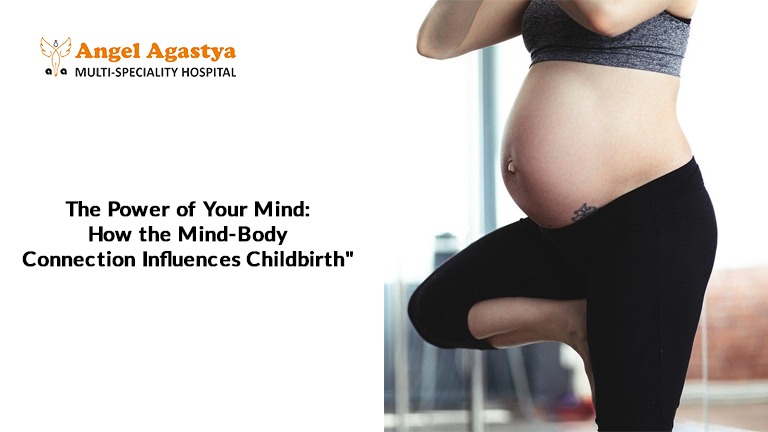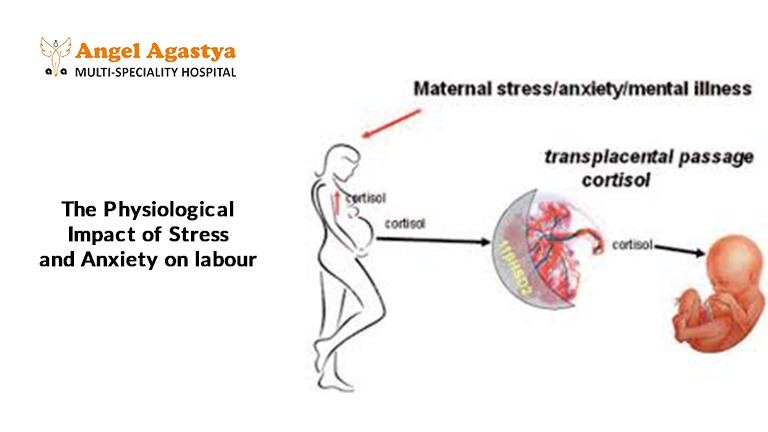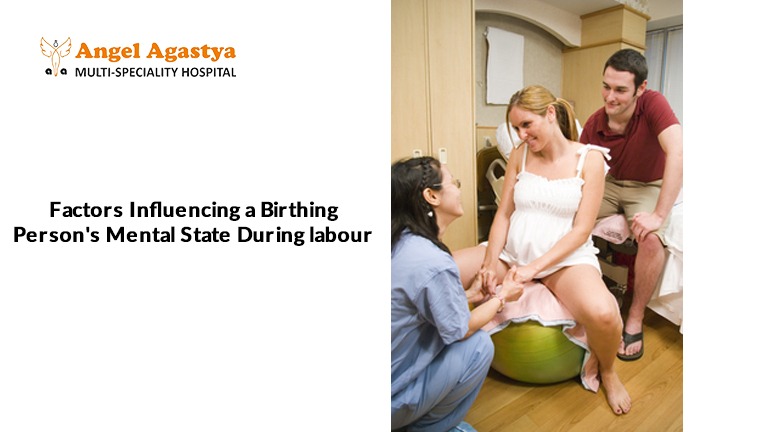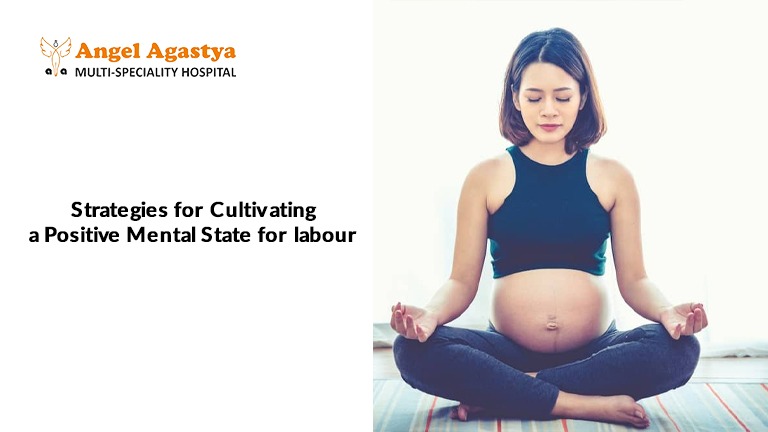The Power of Your Mind: How the Mind-Body Connection Influences Childbirth
Childbirth isn’t just a physical process; your thoughts, emotions, and state of mind play a powerful role too. Exploring the mind-body connection in childbirth can help you prepare with calm, confidence, and clarity.

Introduction
Imagine the excitement and nervousness as your labour begins. With every contraction, the feelings grow stronger as your body gets ready to bring your baby into the world. Your uterus starts to tighten, your cervix becomes soft and slowly opens, and your baby begins the journey to meet you.
But while all these changes are happening in your body, there’s something else that has a big effect on your labour your mind.
In many Indian homes, elders often tell pregnant women to “stay calm and stay happy.” These are not just sweet words they are also supported by science. Today, doctors know that your thoughts, feelings, and mental state can affect how your labour goes.
If you feel scared, stressed, or worried, your body can become tight and tense, which can make your labour slower and more painful. But if you feel safe, supported, and relaxed, your body will work better, and labour can move more smoothly and naturally. Your emotions change your hormones, and these hormones can help or slow down the birth process.
In this blog, we’ll talk about how your mind and feelings affect labour, how you can prepare yourself for it, and how old Indian traditions like chanting, breathing, and family support match perfectly with modern science’s understanding of the mind-body connection in childbirth.
The Physiological Impact of Stress and Anxiety on labour
In ancient Indian texts, pregnancy is seen as a time to stay happy, peaceful, and spiritually positive. Our grandmothers always told us to avoid stress and keep our minds calm, and now science explains why. This isn’t just a belief; it’s wisdom based on how closely our mind and body are connected, especially during childbirth.

The Fight-or-Flight Response and Oxytocin Levels
When a mother feels fear or anxiety during labour, her body gets ready for “fight or flight,” like it would in a dangerous situation. This response releases stress hormones like adrenaline and cortisol. While these hormones are helpful in dangerous situations, they can slow down the birth process.
These stress hormones lower the amount of oxytocin, which is the hormone that helps start and keep contractions going. Oxytocin also helps reduce pain, creates a bond between mother and baby, and keeps the mother calm. When adrenaline takes over, oxytocin drops, which can slow down labour, make the pain worse, and cause more stress.
How Stress Affects the Uterus
Understanding the profound mind-body connection in childbirth reveals how stress manifests physically; just as tension clenches your jaw or tightens your fist, fear and anxiety can cause the uterine muscle to tighten during labor.
Instead of the smooth, wave-like contractions that help open the cervix, the uterus may contract in an irregular way. This can make labour longer, more tiring, and more painful.
Blood Flow and Oxygen Levels
When the body feels fear, it sends blood to the muscles needed for “fighting or running.” This means less blood goes to the uterus and placenta, which can reduce the oxygen supply to the baby. This can cause stress for the baby and might need medical help.
But when the mother feels safe and supported, blood flows properly, keeping both her and the baby healthy.
The Fear-Tension-Pain Cycle
Fear causes tension. Tension causes pain. Pain causes more fear. This cycle can make labour harder.
In many Indian villages, older women help break this cycle with calming techniques like deep breathing, chanting mantras, soft lighting, and calm music. These traditional methods align with modern relaxation techniques, showing how the mind and body work together in childbirth.
Staying calm, feeling supported, and trusting your body are not just emotional states; they’re part of the powerful mind-body connection in childbirth that can make labour smoother and safer.
Factors Influencing a Birthing Person’s Mental State During Labour

Prenatal Education
Knowledge reduces fear. Antenatal classes, whether modern or based on Indian traditions like yoga for pregnancy, help you prepare mentally for what lies ahead.
Support System
Doulas, midwives, mothers, and partners play a vital role. In Indian culture, a supportive companion is someone who brings emotional grounding and that’s exactly what you need in labour.
Birth Environment
Whether in a hospital, birthing center, or at home, your surroundings matter. A quiet room, dim lights, favorite incense, or even a sacred idol nearby can support the mind-body connection in childbirth by helping you feel safe, calm, and protected.
Past Experiences
A previous traumatic birth can influence the mental state. Processing those experiences through counseling or journaling can help you reclaim your power.
Beliefs and Expectations
If you believe birth is natural, powerful and divine, your body will respond accordingly. That’s why positive birth stories are so powerful — they plant hope instead of fear.
Fear of Pain and the Unknown
This is common but conquerable. Indian birthing traditions often encourage chanting or focusing on breath to shift attention away from pain and toward trust in the body.
Trust in the Body
Trusting that your body knows what to do, just like it grew your baby, can bring immense peace.
Communication with Healthcare Providers
Respectful communication builds trust. Involving the mother in decisions, answering her questions, and honoring her wishes support the mind-body connection in childbirth by helping her stay calm and confident.
Strategies for Cultivating a Positive Mental State for Labour

Mindfulness and Meditation
Practicing meditation trains your mind to stay in the present, ride the wave of contractions and not spiral into fear.
Breathing Exercises
Breathing is the bridge between the body and mind. Practice alternate nostril breathing or deep belly breaths to center yourself.
Visualization and Affirmations
Imagine your cervix opening like a lotus or visualize holding your baby. Use affirmations like:
“My body knows how to give birth.”
“Each contraction brings my baby closer.”
Hypnobirthing
Hypnobirthing is becoming more popular in India. It combines relaxation, visualization, and self-hypnosis to help mothers stay calm during labour. It is similar to many Vedic techniques that train the mind to stay focused and relaxed.
Support Team
Surround yourself with people who uplift you and support a positive mind-body connection in childbirth. Avoid negativity or anyone who adds fear to your experience.
Positive Birth Environment
Create your sacred space bring a dupatta that smells of home, play a soothing bhajan, or hang family photos.
Address Fears and Anxieties
Talk to someone you trust a midwife, friend, or therapist. Don’t carry fears alone.
Trusting the Process
Labour isn’t something to be controlled, it’s something to surrender to. Like a river, it flows best when there is no resistance.
The Role of Healthcare Providers in Supporting a Positive Mental State
Healthcare providers are more than just doctors or nurses they are part of your birth team. They help create a safe space for you, where you feel supported, respected, and empowered.

Communication and Information
Talking to you in a calm, clear way is important. Simple words like “You’re doing great” can help you feel more confident and less worried during labor.
Creating a Calm Environment
The atmosphere around you matters. Calm voices, kind looks, and having your family close can make a big difference. Following cultural practices, offering prayers, or performing rituals can support the mind-body connection in childbirth, helping you feel more comfortable and safe.
Encouragement and Positive Reinforcement
Say things like:
“You are strong.”
“Your body was made for this.”
These words empower.
Minimizing Unnecessary Interventions
Letting labor happen naturally, when safe, can help you trust your body and the process. This builds confidence in the way your body works.
Empowering Decision-Making
When healthcare providers respect your choices, clearly explain your options, and actively involve you in decision-making, it profoundly strengthens the mind-body connection in childbirth, fostering a sense of control and inner resilience during labor.
Conclusion
Childbirth is not just about the body it’s also about the mind, heart, and soul. It’s a big life moment that brings both challenge and beauty. While doctors and hospitals take care of the physical part, your thoughts and emotions play a big role too.
What you think and feel can affect how your labor goes. If you feel scared or worried, it can slow things down. But if you feel calm, loved, and safe, your labor can move more smoothly.
In Indian stories and traditions, mothers are seen as Shakti – a symbol of strong energy, power, and courage. You carry that same power inside you.
So always remember: You are strong. Your body knows what to do. Your mind, through the mind-body connection in childbirth, can help you stay calm and focused. Trust yourself and this journey. You were made to bring life into the world.
You are not alone. You are powerful. And you are ready.
Frequently Asked Questions (FAQs)
1. What is the mind-body connection in childbirth?
It refers to how your emotional and mental state affects physical processes like contractions, pain perception, and labour progression.
2. Can stress actually delay labour?
Yes. Stress releases hormones like adrenaline that inhibit oxytocin, potentially stalling or slowing labour.
3. What are some Indian practices to stay mentally calm during labour?
Cultivating the mind-body connection in childbirth can be beautifully supported by time-honored practices such as chanting mantras, engaging in deep breathing exercises, listening to devotional music, and drawing strength from the presence of loved ones. Have a look here to know more.
4. Does fear always increase pain?
Yes. Fear triggers tension, which increases pain in a loop called the Fear-Tension-Pain cycle.
5. Can meditation help during labour?
Indeed. By nurturing the mind-body connection in childbirth through regular meditation, you can significantly enhance your capacity to remain calm, focused and present during contractions.
6. What role do doulas play in mental well-being?
Doulas provide emotional support, reassurance, and non-medical guidance, all of which help keep the mother mentally centered.
7. Is a home birth better for a calm mind?
It depends. If the mother feels safer and more relaxed at home, then yes; a home birth can support the mind-body connection in childbirth, but only when it’s medically appropriate and attended by skilled professionals.
8. Can affirmations influence labour?
Yes. Repeating empowering affirmations can reshape beliefs, reduce anxiety, and improve focus during labour.
9. How can partners help?
By offering touch, encouraging words, and calm presence, partners are crucial pillars of emotional support.
10. What is the most important mental preparation for childbirth?
Trust in your body, the process, and your support team. Confidence strengthens the mind-body connection in childbirth and is the cornerstone of an empowered birth.

